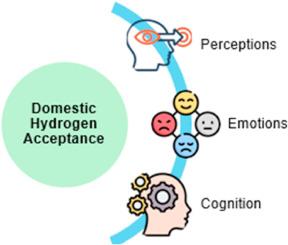氢能住宅创新决策过程建模:消费者接受度和采用意愿的综合模型
IF 8.3
2区 工程技术
Q1 CHEMISTRY, PHYSICAL
引用次数: 0
摘要
随着全球能源转型的推进,一系列驱动因素和障碍将继续影响消费者对新兴低碳技术的态度和行为意向。氢燃料取暖和烹饪设备等住宅领域技术的创新决策过程本身就受到感知、认知和情感因素之间复杂相互作用的制约。为此,本研究响应了综合研究视角的号召,以推进消费者参与家用氢能转型的理论和经验见解。本研究利用在英国收集的在线调查数据,系统地探讨了综合建模方法是否能支持更高水平的解释力和预测力。利用家用氢能接受度统一理论的基础,分析表明生产观念、公众信任、感知的相对优势、安全观念、知识和意识以及积极情绪将影响消费者对氢能住宅的支持。相反,破坏性影响感知、社会经济成本感知、财务感知和负面情绪可能会阻碍家用氢能的过渡。消费者的接受程度将极大地影响氢气锅炉和灶具的应用前景,因为从技术和安全角度来看,氢气锅炉和灶具比天然气设备更具优势。这项研究证明,在对创新决策过程的早期阶段进行建模时,采用综合理论视角具有预测性优势,同时也为未来利用创新研究方法提供了机会。随着国家氢能经济的发展,采用基于神经科学的方法可能有助于加深对影响消费者对氢能住宅看法的神经、心理和情感特征的科学理解。本文章由计算机程序翻译,如有差异,请以英文原文为准。

Modelling the innovation-decision process for hydrogen homes: An integrated model of consumer acceptance and adoption intention
As the global energy transition progresses, a range of drivers and barriers will continue to shape consumer attitudes and behavioural intentions towards emerging low-carbon technologies. The innovation-decision process for technologies composing the residential sector such as hydrogen-fuelled heating and cooking appliances is inherently governed by the complex interplay between perceptual, cognitive, and emotional factors. In response, this study responds to the call for an integrated research perspective to advance theoretical and empirical insights on consumer engagement in the domestic hydrogen transition. Drawing on online survey data collected in the United Kingdom, where a policy decision on ‘hydrogen homes’ is set for 2026, this study systematically explores whether an integrated modelling approach supports higher levels of explanatory and predictive power. Leveraging the foundations of the unified theory of domestic hydrogen acceptance, the analysis suggests that production perceptions, public trust, perceived relative advantage, safety perceptions, knowledge and awareness, and positive emotions will shape consumer support for hydrogen homes. Conversely, perceived disruptive impacts, perceived socio-economic costs, financial perceptions, and negative emotions may impede the domestic hydrogen transition. Consumer acceptance stands to significantly shape deployment prospects for hydrogen boilers and hobs, which are perceived to be somewhat advantageous to natural gas appliances from a technological and safety perspective. The study attests to the predictive benefits of adopting an integrated theoretical perspective when modelling the early stages of the innovation-decision process, while acknowledging opportunities for leveraging innovative research approaches in the future. As national hydrogen economies gain traction, adopting a neuroscience-based approach may help deepen scientific understanding regarding the neural, psychological, and emotional signatures shaping consumer perspectives towards hydrogen homes.
求助全文
通过发布文献求助,成功后即可免费获取论文全文。
去求助
来源期刊

International Journal of Hydrogen Energy
工程技术-环境科学
CiteScore
13.50
自引率
25.00%
发文量
3502
审稿时长
60 days
期刊介绍:
The objective of the International Journal of Hydrogen Energy is to facilitate the exchange of new ideas, technological advancements, and research findings in the field of Hydrogen Energy among scientists and engineers worldwide. This journal showcases original research, both analytical and experimental, covering various aspects of Hydrogen Energy. These include production, storage, transmission, utilization, enabling technologies, environmental impact, economic considerations, and global perspectives on hydrogen and its carriers such as NH3, CH4, alcohols, etc.
The utilization aspect encompasses various methods such as thermochemical (combustion), photochemical, electrochemical (fuel cells), and nuclear conversion of hydrogen, hydrogen isotopes, and hydrogen carriers into thermal, mechanical, and electrical energies. The applications of these energies can be found in transportation (including aerospace), industrial, commercial, and residential sectors.
 求助内容:
求助内容: 应助结果提醒方式:
应助结果提醒方式:


